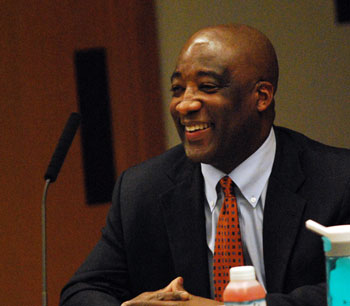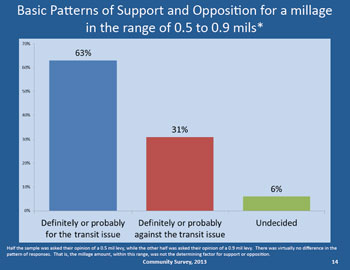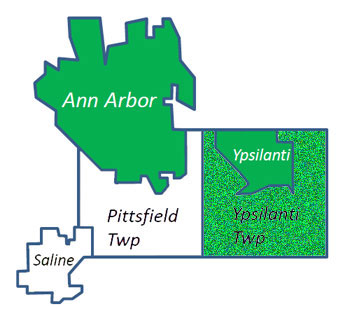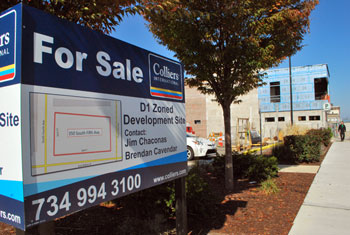Tax Question Focus of Transit Board Meeting
Ann Arbor Area Transportation Authority board meeting (Feb. 20, 2014): The audience for the board’s regular monthly meeting was the largest in at least five years, as 35-40 people attended to show support for the main item on the agenda.

Michael Ford, CEO of the Ann Arbor Area Transportation Authority, just before the start of the Feb. 20, 2014 AAATA board meeting. (Photos by the writer.)
That main item was a board vote to place a millage request before voters on May 6, 2014. The request – on a 0.7 mill tax that would be levied to pay for additional services over the next five years – would need a majority of votes across the city of Ann Arbor, the city of Ypsilanti and Ypsilanti Township to be approved.
The millage is supposed to pay for a set of service improvements over a period of five years. Those improvements include increased frequency during peak hours, extended service in the evenings, and additional service on weekends. Some looped routes are being replaced with out-and-back type route configurations. The plan does not include operation of rail-based services.
The AAATA has calculated that the improvements in service add up to 90,000 additional service hours per year, compared to the current service levels, which is a 44% increase.
The board’s vote to put the question on a May 6 ballot was unanimous, and came after more than a dozen people spoke during public commentary at the start of the meeting, urging the board to take the step of making a funding request of voters.
Elected officials as well as leaders of the faith, labor and disability communities all spoke in favor of making the request of voters to fund the service expansion, citing arguments based on economic and social justice. They pointed to the long period of planning that had begun about three years ago with a much more ambitious effort to expand service countywide. The current, more limited approach – focused just on the “urban core” area of the city of Ann Arbor and the two Ypsilanti jurisdictions – was a way to meet urgent transportation needs, they said.
After the board’s vote, during public commentary at the end of the meeting, one Ypsilanti resident recalled her own history marching with Rosa Parks down Woodward Avenue in Detroit. Although she’s been involved in activism for many years, she told the board, she could not think of anything that she was in the room to witness that was this important to her personally and to the city in which she lives.
Compared to typical AAATA board meetings, the atmosphere was relatively boisterous, as supporters at times chanted, “More buses, more places, more often!” But one speaker at the end of the meeting cautioned against the celebratory mood, saying there was now a lot of work to do. A counterpoint to the solid support the board heard from most of the speakers had been offered by the very first speaker of the evening. He asked the board to delay the election until November, arguing that it would save the roughly $80,000-$100,000 cost of holding the May election, and result in broader participation in the vote. Another point raised by that speaker was concern that everyone pay an equitable share for the additional transportation.
Although the main event was the resolution that placed the millage question on the ballot, the board’s agenda featured nine other items, many of which were at least tangentially related to the millage question.
For example, in other action the board approved a change to its budget to allow for up to $100,000 to be spent on the cost of holding the special election. The board also approved a funding agreement with Ypsilanti Township, to make explicit what will happen to the township’s existing purchase of service agreement (POSA) if the millage is approved. And as part of the board’s routine annual business, it approved a funding request to the state of Michigan – but did not factor in an increased level of service in the budget submitted to the state. That was done on the instruction of the Michigan Dept. of Transportation. That request can be amended if the millage succeeds.
Also at the Feb. 20 meeting, the board approved changes to its bylaws. Those changes were prompted by a change in governance to the AAATA last year – the addition of the two Ypsilanti jurisdictions. With the increase from seven to 10 members, the definition for the number of board members constituting a quorum or a majority needed to be modified. Out of that review of the bylaws came a decision to increase public speaking turns from a two-minute time limit to three minutes.
In other business, the board approved the hiring of a consultant to help the AAATA with a planned upgrade to its computer-aided dispatch and vehicle locating software. The board also approved the recently completed audit report for the 2013 fiscal year, which ended Sept. 30, 2013.
Another item approved by the board was a new contract for unarmed security services. And finally, the board authorized a contract for an insurance broker.
Among the various operational updates received by the board was the announcement that the newly constructed Blake Transit Center in downtown Ann Arbor would be open by March 17, 2014. [Full Story]






